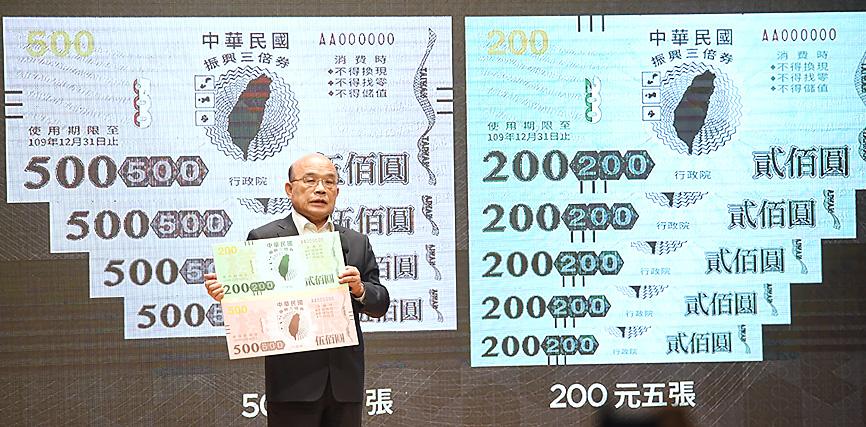The government’s Triple Stimulus Vouchers helped boost Taiwan’s retail sector last year amid the COVID-19 pandemic, the Ministry of Economic Affairs said yesterday as it unveiled the final tally for the program.
The ministry’s statistics showed that 23.32 million people in Taiwan, or 99 percent of the population, participated in the program, claiming either paper or digital vouchers.
The ministry said that 99.6 percent of the vouchers, or NT$64.28 billion (US$2.25 billion), were redeemed by vendors.

Photo: Liu Hsin-de, Taipei Times
Administration of the vouchers program, including printing and distribution, cost more than NT$2 billion, it said.
Department of Commerce Deputy Director-General Chen Mi-shun (陳秘順) said that the retail sector made a remarkable recovery after the launch of the program in the middle of July last year, which put NT$3,000 of vouchers in the pockets of eligible people.
“After five consecutive months of negative growth, the retail sector’s sales returned to positive territory in July last year, and there were record sales in the sector from August to November,” Chen said.
As the savings rate in Taiwan, is high, a cash stimulus would have gone into bank accounts or other investments, he said.
Marginalized and low-income groups received the vouchers without having to pay, he said.
“We designed the program to minimize the substitution effect and maximize the multiplication effect,” Chen said. “Once the vouchers were spent, those who received them could use them again.”
The substitution effect is when people used the vouchers on something they would have purchased without the program.
However, an informal survey showed that most used the vouchers to treat themselves.
“I got some nicer tea bags than I would have otherwise, and my boyfriend and I went out for a fancy meal,” a woman surnamed Huang (黃) said. “We were more willing to spend the vouchers.”
Others surveyed said that they took advantage of the vouchers to buy a new camera at a discount with a voucher-only deal or on convenience store gift cards.
Donovan Watson, an English teacher living in New Taipei City’s Sindian District (新店), went to Zara and bought clothing on an impulse.
Watson said that he was surprised, but appreciative that foreigners who are permanent residents were included in a later round of the program.
National Central University economist Dachran Wu (吳大任) said that the program had a positive effect and was one of the factors that helped the turnaround in the retail sector.
“After being cooped up for COVID-19 and with no way to leave the country, everybody wanted some revenge shopping,” Wu said.

Zhang Yazhou was sitting in the passenger seat of her Tesla Model 3 when she said she heard her father’s panicked voice: The brakes do not work. Approaching a red light, her father swerved around two cars before plowing into a sport utility vehicle and a sedan, and crashing into a large concrete barrier. Stunned, Zhang gazed at the deflating airbag in front of her. She could never have imagined what was to come: Tesla Inc sued her for defamation for complaining publicly about the vehicles brakes — and won. A Chinese court ordered Zhang to pay more than US$23,000 in

Taiwan Semiconductor Manufacturing Co (TSMC, 台積電) yesterday held its first board of directors meeting in the US, at which it did not unveil any new US investments despite mounting tariff threats from US President Donald Trump. Trump has threatened to impose 100 percent tariffs on Taiwan-made chips, prompting market speculation that TSMC might consider boosting its chip capacity in the US or ramping up production of advanced chips such as those using a 2-nanometer technology process at its Arizona fabs ahead of schedule. Speculation also swirled that the chipmaker might consider building its own advanced packaging capacity in the US as part

Taiwan Semiconductor Manufacturing Co (TSMC, 台積電) yesterday said that its investment plan in Arizona is going according to schedule, following a local media report claiming that the company is planning to break ground on its third wafer fab in the US in June. In a statement, TSMC said it does not comment on market speculation, but that its investments in Arizona are proceeding well. TSMC is investing more than US$65 billion in Arizona to build three advanced wafer fabs. The first one has started production using the 4-nanometer (nm) process, while the second one would start mass production using the

US President Donald Trump has threatened to impose up to 100 percent tariffs on Taiwan’s semiconductor exports to the US to encourage chip manufacturers to move their production facilities to the US, but experts are questioning his strategy, warning it could harm industries on both sides. “I’m very confused and surprised that the Trump administration would try and do this,” Bob O’Donnell, chief analyst and founder of TECHnalysis Research in California, said in an interview with the Central News Agency on Wednesday. “It seems to reflect the fact that they don’t understand how the semiconductor industry really works,” O’Donnell said. Economic sanctions would